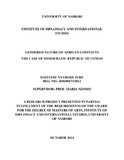| dc.description.abstract | The Democratic Republic of Congo (DRC) has experienced two successive wars, the first was a
rebellion which started in 1996 to 1997 and saw the advancement of rebels to Kinshasa and the
eventual overthrow of the Mobutu’s regime. The second war started in 1998 to 2002 with the
invasion of Eastern Congo by rebels with the support of regional governments, whereas the DRC
government had its support from some African countries. The two wars led to loss of life which
has been estimated at four million. The war has also witnessed massive violation of human rights
against it citizens specifically women, girls and children. The findings of this research shows
that women faced Sexual Gender Based Violence during the 1st and 2nd DRC conflict either as a
result of failure on the part of commandants’ giving express instructions on the non violation of
their rights or express orders to sexually violate women and girls were given as a strategy to
punish their enemies. The findings also show that strategies to end SGBV have focused largely
on women and girls due to the attribution of SGBV as violence against women and not men. This
has meant that men were not included in any program that was meant to address SGBV thereby
rendering interventions ineffectual. | en_US |

